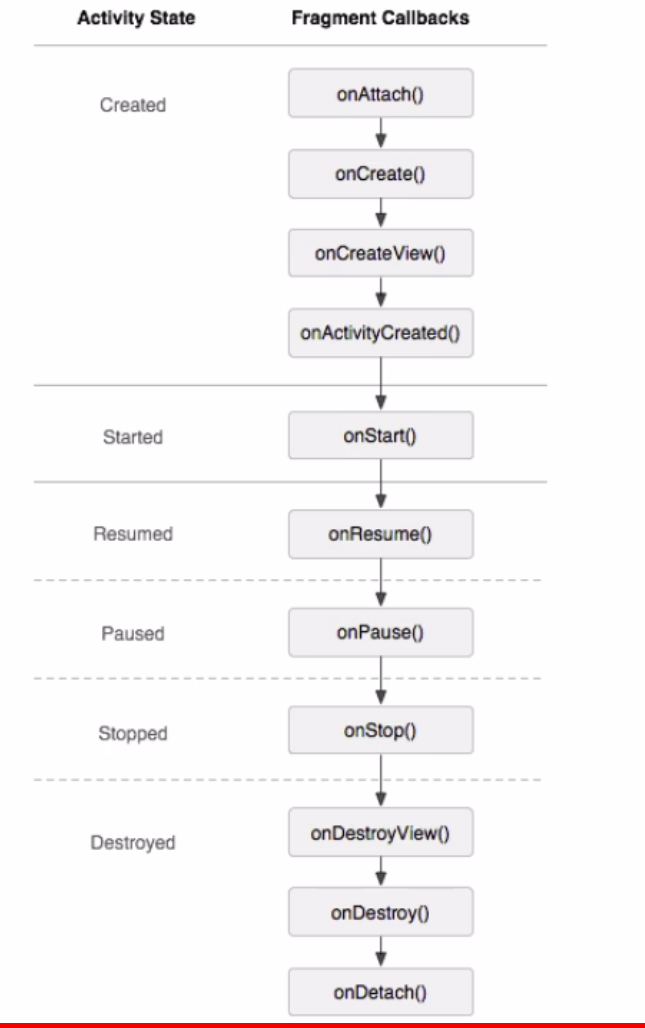Android-------------fragment的学习
一、fragment的静态使用
1.使用步骤:
a.继承fragment 重写onCreatevVew()的回调方法
b.设置Fragment的布局
c.在Activity中声明Fragment 使用方式与控件相同
2.代码展示:
a.继承fragment 重写onCreatevVew()的回调方法
public class TileFragment extends Fragment {
@Nullable
@Override
public View onCreateView(@NonNull LayoutInflater inflater, @Nullable ViewGroup container, @Nullable Bundle savedInstanceState) {
return inflater.inflate(R.layout.tilefragment, null);
}
}
b.设置Fragment的布局<LinearLayout xmlns:android="http://schemas.android.com/apk/res/android"
android:layout_width="match_parent"
android:layout_height="50dp"
android:orientation="horizontal"> //忘记写会有控件覆盖,会报错的
<ImageView
android:id="@+id/iv_bck"
android:layout_width="35dp"
android:layout_height="35dp"
android:src="@mipmap/ic_launcher" />
<TextView
android:gravity="center"
android:layout_marginLeft="10dp"
android:layout_width="match_parent"
android:layout_height="match_parent"
android:text="我是标题"
/>
</LinearLayout>
c.在Activity中声明Fragment 使用方式与控件相同
<LinearLayout xmlns:android="http://schemas.android.com/apk/res/android"
xmlns:app="http://schemas.android.com/apk/res-auto"
xmlns:tools="http://schemas.android.com/tools"
android:layout_width="match_parent"
android:layout_height="match_parent"
android:orientation="vertical" //这个忘写会报错误,很难找出来的
tools:context=".MainActivity">
<fragment
android:name="com.example.zhang.myapplication.TileFragment" ----------->引用标签来静态加载fragment的数据
android:layout_width="match_parent"
android:layout_height="50dp"></fragment>
</LinearLayout>
二、fragment的动态使用
a.创建Fragment的管理器对象
b.获取Fragment的事物对象并开启
c.调用事物的动态方法:动态的添加、动态的删除、动态的替换
d.提交事物
在xml文件中的代码,在布局文件中写好布局并设置ID,通过FragmentTransation.add去动态添加
<LinearLayout
android:orientation="vertical"
android:layout_width="match_parent"
android:layout_height="50dp"
android:id="@+id/fragment_tile"
/>
<LinearLayout
android:orientation="vertical"
android:layout_width="match_parent"
android:layout_height="match_parent"
android:id="@+id/frag_content"
/>
//获得FragmentManager的对象
FragmentManager manager = getSupportFragmentManager();
//获取Fragment的事物对象并开始
FragmentTransaction transaction = manager.beginTransaction();
//动态添加fragment (add remove replace)
transaction.add(R.id.fragment_tile, new TileFragment());
transaction.add(R.id.frag_content, new ContentFragment());
//提交获得的事物
transaction.commit();
三、Fragment的生命周期
1.第一次启动app的时候
onAttach:activity与fragment的产生关联时候进行回调
onCreateView : 用户第一次绘制界面
onActivityCreate : fragment与activity创建成功进行回调

2.切换其他fragment的时候

3.返回第一次启动的fragment的时候

4.按home键的时候

5.home键之后再重新返回当前界面

6.按back键的时候

7.fragment和activity的生命周期

posted on 2018-10-28 22:43 zhang11111wei 阅读(112) 评论(0) 编辑 收藏 举报



